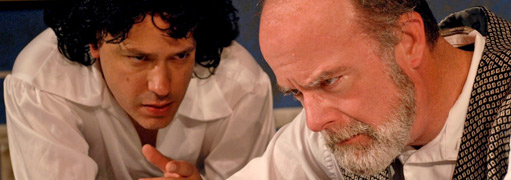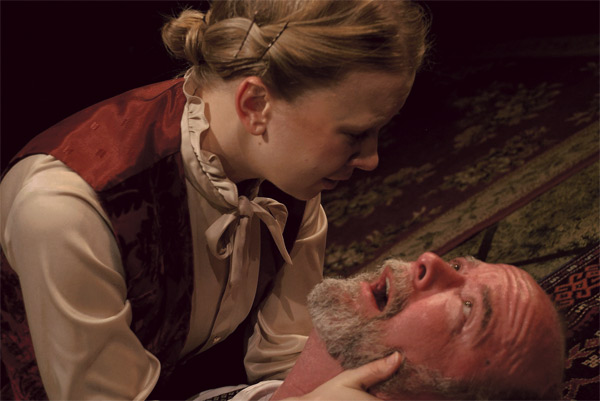Fyodor Dostoyevsky is in desperate straits. He promised his publisher Stellovsky a new work by the first of November—just 27 days away. If he doesn’t deliver by the deadline, Stellovsky will keep all of Dostoyevsky’s royalties for the next seven years, dooming him to ruin. And the Russian writer hasn’t even begun his novel.That’s the initial premise for A Jewel in the Manuscript by Santa Fe playwright Rosemary Zibart. Anna Snitkina, a precocious young stenographer, is sent to help Dostoyevsky. “A woman?” he snarls. “They sent me a woman? Do you know the kinds of things I write about?”He has a point. His works often deal with the most sordid and unsavory aspects of humanity—gambling, prostitution, murder. They could hardly be considered appropriate material for a young woman in the 19th century. But in fact A Jewel in the Manuscript is based on the true story of Snitkina’s employment and eventual marriage to the author. As the play opens, she shows up dutifully at his door at exactly 11:30 a.m., “not a minute early and not a minute late” as requested. Dostoyevsky is horrified at the prospect of a female assistant. But to his surprise, she seems to understand something fundamental about his work and his nature. With her help, he begins to glimpse some hope of completing the impossible task in time. A graphic and unsettling depiction of Jesus after his crucifixion, emaciated and beaten, hangs front and center in the set, vividly underscoring the play’s central themes. Snitkina remarks on the painting and Dostoyevsky’s strange fascination with it. He hangs it in his home, she tells her mother, to remind himself that Jesus was a man, and when men die, they stink. This acknowledgment of the struggle between divinity and humanity is at the heart of A Jewel in the Manuscript and of Anna and Fyodor’s relationship. Both acutely feel the presence of a divine energy at work within the world. At the same time, they’re are deeply affected by dark, animalistic corners of the human psyche that Dostoyevsky examined in his novels. Zibart’s play is elegant and deeply philosophical, as she gracefully weaves Dostoyevsky’s words with her own, probing ideas that claw at the extremes of human experience, and question the nature of the sacred and the profane within our lives. To pose these questions so directly within a work of fiction without resorting to lecturing or preachiness is remarkable. The characters grapple with these weighty ideas about our existence and relationship with God. The questions arise as both try in their own ways to relate to each other and to the world. But the chief shortcoming of Jewel is its headiness. While the characters debate these philosophical notions intellectually, they’re hardly ever reflected in their actions, behavior or choices. More than anything, this play is the story of Dostoyevsky’s redemption—and yet, we never see a real change in his character. In the first act, Snitkina describes him to her mother as aloof, dismissive and even rude. But we never really see that surly, off-putting demeanor. We know it exists because we hear about it, but Dostoyevsky doesn’t embody it, nor do we see her react in the moment but only discuss it later with her mother. In the second act, as he accepts his redemption and becomes a more open and evolved man, we’re robbed of the full effect of the transformation. When Dostoyevsky breaks down and confesses how completely he has succumbed to his darkest, most depraved impulses, it’s difficult to believe that the genteel man on stage could ever become consumed by such animal passion. And when Snitkina asks him the question that lies at the crux of the entire story—"Do you think that God’s light shines everywhere except on you?"—it doesn’t wholly resonate with the characters as they’ve been presented to us. A Jewel in the Manuscript is a well-constructed play, and Zibart proves herself to be both a skilled writer and philosopher. I’ve seen countless plays crash and burn trying to imbue themselves with the kind of depth that Zibart so delicately breathes into her story. But until the emotional core behind the characters’ language is uncovered, this play feels unfinished. A Jewel in the Manuscript is itself stuck in the clouds, never quite realizing the nitty-gritty of human existence that so enthralled Dostoyevsky.
A Jewel in the Manuscript Runs through Nov. 11Friday and Saturday at 8 p.m.Sunday at 2 p.m. Adobe Theater 9813 Fourth Street NW Tickets: $15 for general admission, $13 for seniors and students898-9222, adobetheater.org










